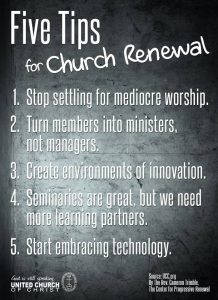 Cameron Trimble, CEO of the Center for Progressive Renewal, recently offered five suggestions to aid in the work of congregational renewal:
Cameron Trimble, CEO of the Center for Progressive Renewal, recently offered five suggestions to aid in the work of congregational renewal:
- Stop settling for mediocre worship.
- Turn members into ministers, not managers.
- Create environments of innovation.
- Seminaries are great, but we need more learning partners.
- Start embracing technology.
I agree with Trimble that each of these is an important step toward renewal. Furthermore, I believe the time for conversation that doesn’t lead to action ended long ago. We are in an era that requires churches to move from merely considering possibilities to enacting them.
Better Worship
In most congregations worship is the #1 way people experience your community of faith each week. It is important that each and every such service go far beyond merely going through the motions in order to encourage passionate worship.
For more on this see
Ministers not Managers
People become a part of your community of faith so that they can be difference makers. While there is a place for church governance (standing boards, committees, council/session/managing board), the structure that supports such oversight should be lean. No standing board or committee should ever meet simply because another month has passed. Engagement is the goal; every member (if your congregation still employs the concept of membership) and regular participant should be actively engaged in ministry. Instead of measuring how many people serve on boards and committees congregations should strive to get 100% of their people doing ministry (if this is new consider setting a goal of a specific % for this year and then incrementally increasing this percentage each year).
For more on this see
- Future Church: Discipleship
- What’s Holding Christianity Back? Boards
- Future Church: More Egalitarian
Innovate, Innovate, Innovate
There is a reason that many reading this blog know the so-called seven last words of the church are “we never did it that way before.” After decades of decline many congregations can only label their strategic planning as insane of they expect a future of something other than decline using their current model of ministry. Creating a culture of innovation should be mandatory.
For more on this see
Seminaries & More
As someone who benefited from a traditional on campus seminary experience, I know that it added significant value to my formation as a minister. I also know that times are changing more rapidly in higher education than most people realize as I recently spent four years in higher education administration in the field of online learning. As mainline Protestant churches and ministries continue to adapt to an ever changing world, the M.Div. is no longer the required degree to enter pastoral ministry (and in the not too distant future may no longer be the dominant way as more people pursue alternative pathways through the guidelines established by their respective denominations). Also, watch for the return of extended mentoring in the form of apprenticeship.
For more on this see
- Fully Online Seminary Education
- A Progressive Seminary First
- Any recent article on Competency Based Education (and think of how this might apply to pastoral preparation)
Embrace Technology
If the primary way your congregation communicates is by paper then you have yet to embrace technology. In Len Sweet’s way of thinking, you have yet to make the shift from Gutenberg Christianity to Google Christianity (for more on this see my review of Viral: How Social Networking is Poised to Ignite Revival). Reality check: our world is not producing any more Gutenbergians. Younger generations and those who follow will experience interactive information on screens, not static information on paper.
For more on this see
So What?
Church renewal is an exciting topic. If your congregation has experienced years of decline and shifted from a mission focus to a maintenance orientation, then renewal is the language of a brighter future.
I write this post about six weeks into my role as Transitional Minister at Fort Myers Congregational UCC. We spent the last five weeks considering what vibrant, growing, fruitful congregations share in common: radical hospitality, intentional faith formation, risk-taking mission and service, extravagant generosity, and passionate worship (borrowed from Robert Schnase’s book: Five Practices of Fruitful Congregations). Our newly established Transition Team has just begun their work. Our community of faith is focused on understanding who we are (what makes us unique, especially related to our strengths) in order to discern where God is leading us for an upcoming season of renewal. Once this is better understood we will determine the resources needed to move forward, secure them, and partner with one another and with God to live into that future.
- Is your congregation more focused on maintenance (keeping the long-running ministries functional and the building and grounds up) or mission? Explain.
- Which of the five suggestions above is currently most challenging for your congregation?
- Share one change your congregation has made in the last 5 years that has had a positive impact on you & one that has had a positive impact on the community in close geographic proximity to your church campus.